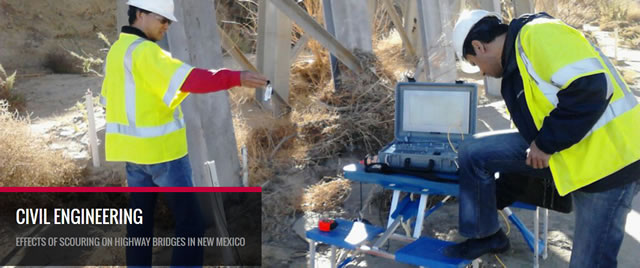
Civil Engineering ETDs
Publication Date
8-27-2012
Abstract
The desire to control rivers to reduce risks of flooding while providing water storage for municipal and agricultural uses has resulted in the disconnection of rivers from their floodplains. An important and often neglected outcome of this detachment is the loss of a plethora of important ecosystem services. This research was focused on answering the following questions related to riparian groundwater storage (bank storage): 1) What is the time to saturation (maximum storage) and time to release of bank storage water as the result of a flood pulse that overbanks a portion of the floodplain?; 2) How does soil stratigraphy impact the movement of water within the floodplain?; and 3) How has historical river engineering and management influenced these processes? The study was conducted on a site in the Rio Grande floodplain in Albuquerque, New Mexico. This site has been the focus of two recent studies which aided in the understanding of the system, and they have both yielded data that was utilized in the model development and calibration of this study. The research questions were answered through a combination of field observations and numerical modeling exercises. The field analysis focused on determining the necessary hydraulic properties that govern water movement through soil. The evaluated properties included saturated hydraulic conductivity, particle size distribution, as well as the development of water retention curves. The results of this laboratory work were used as inputs for a two-dimensonal groundwater model (HYDRUS-2D), which was used to quantify bank storage under a variety of scenarios. Multiple scenarios were studied to answer the research questions; these included variations in the flood stage, flood duration, and variations to the alluvial architecture. Results show bank storage is dominated by horizontal flow through the alluvial aquifer and thus water movement is highly sensitive to floodplain stratigraphy. Also, the highly engineered river system of the middle Rio Grande valley has resulted in the diminished capacity of the floodplain to store water for a prolonged period of time.
Keywords
Floodplains, Groundwater recharge, Groundwater flow. Soil permeability. Watershed hydrology. Floodplains--New Mexico--Albuquerque. Rio Grande Watershed.
Sponsors
National Science Foundation LSAMP Fellowship
Document Type
Thesis
Language
English
Degree Name
Civil Engineering
Level of Degree
Masters
Department Name
Civil Engineering
First Committee Member (Chair)
Stormont, John
Second Committee Member
Weissmann, Gary
Recommended Citation
Samson, Jeffrey. "Quantifying the contribution of bank storage due to an alteration in stream stage." (2012). https://digitalrepository.unm.edu/ce_etds/71
